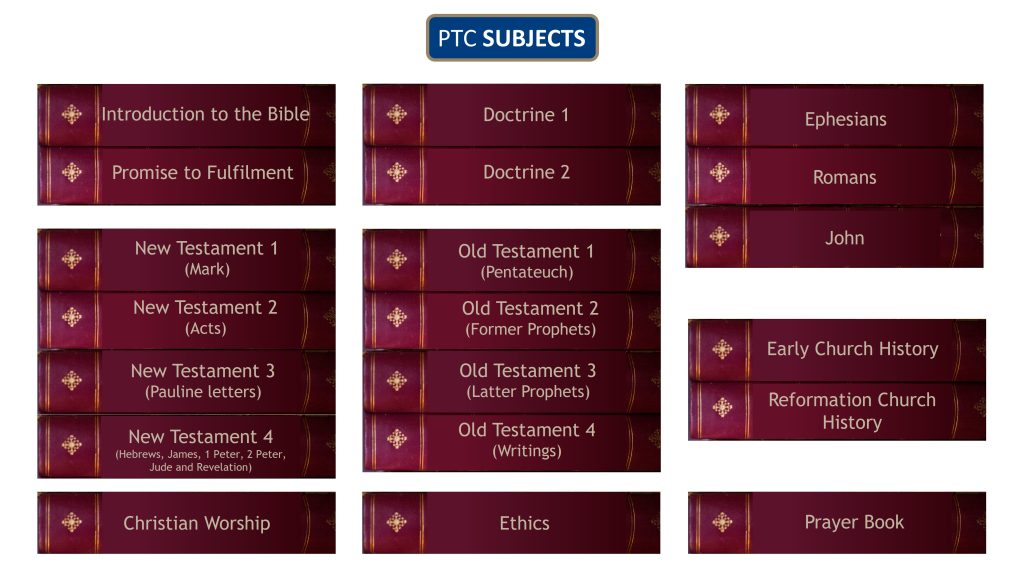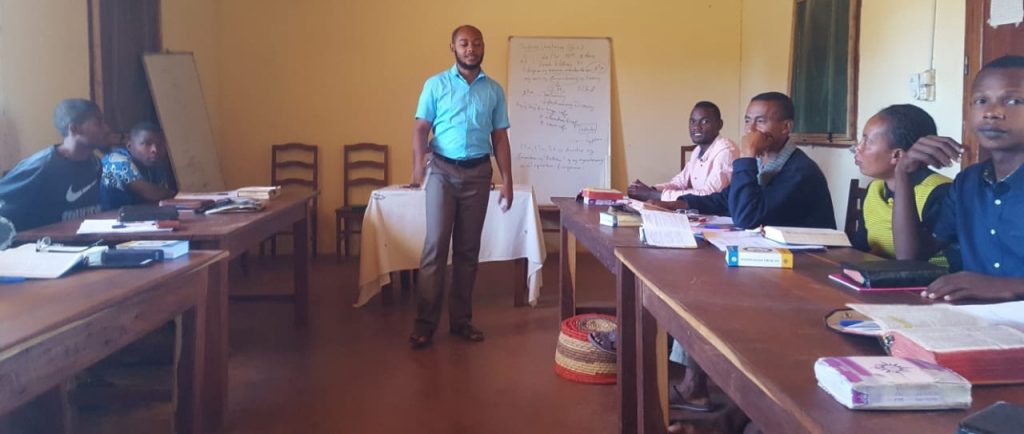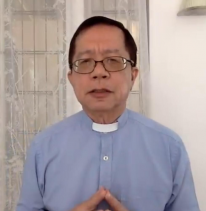Dear friends of CGM,
CGM continues to receive many enquiries from churches and organisations around the world, requesting access to our PTC resources in various languages. Recently we have signed agreements with the Anglican Church in Mozambique & Angola (Portuguese language) and with an independent church in rural Kenya (English and Swahili). We are also investigating partnerships in French‑speaking Africa and with churches in the Pacific.
Your continued support is important to our work. We covet your prayers and thank those who have contributed financially to our translation projects and to our staff costs. This support is essential as we receive no financial help apart from you who give generously. Thank you for helping CGM to make Bible‑based resources available to a growing number of partners around the world.

This newsletter discusses options for delivery of PTC to students around the world and some of our partners’ efforts to adapt to their students’ needs. You will also meet one of our partners, The Anglican Diocese of Mauritius.
PTC DELIVERY OPTIONS MEETING STUDENTS’ NEEDS
There is no typical PTC student
CGM has partners across the world and this means that there is no such person as a typical PTC student or a typical CGM partner. Students come from a huge variety of backgrounds and situations in both urban or rural settings in the ‘first world’ and in the ‘majority world’. And because students live in places ranging from remote villages in PNG, Thailand or Peru to European cities and megacities in Latin America, we need to help our partners deliver PTC to students in these many contexts. Added to this, a single CGM partner may have students in a number of contexts.
Course Delivery – Issues to Consider
These are some of the issues that our partners have to consider when setting up a PTC program:
- Is the internet available? And affordable?
- Do students have smartphones or other devices?
- If students need paper copies, is the cost of photocopying or printing notes prohibitive?
- What is the education and literacy level of the students?
- How isolated are the students?
- Will they be studying by themselves or meeting in groups?
- Is there someone who can mentor them?
Developing delivery options for our partners
It is the responsibility of our partners to deliver courses to their students and not the responsibility of CGM. However, at CGM, we make great efforts to help our partners with content delivery by offering advice and training; and through CGM’s development of an increasing range of course delivery options.
OUR PARTNERS NEED TO BE ADAPTABLE WHEN THINGS ARE NOT WORKING
Here are some examples of our partners’ efforts to adapt to students’ needs:
Restore PNG (Milne Bay PNG)
Restore PNG works with a number of local church denominations, including the Anglican Diocese of Dogura, in Milne Bay Province, PNG. Restore PNG initially set up an online learning platform, hosted by CGM, to deliver courses to students. This works for well for urban students (when the internet is working), but for remote rural students without internet this delivery solution was not working. For these students, there was a move to the use of paper copies, however, this has proved to be very expensive and difficult to distribute.

Restore is now investigating the use of low‑cost android tablets, loaded with our newly developed “Interactive offline PTC Lesson Apps”. While the upfront cost is higher, the long‑term cost will be much lower than the cost of photocopying. With these Lesson Apps, the students will also have access to revision quizzes, that are automatically set and marked, without any connection to the internet.
Evangelium21 (a network of Christians from all over German‑speaking Europe)
Evangelium21 manages all the PTC infrastructure themselves, including translation of PTC subjects into German and the maintenance of their own online learning platform. The main difficulty that they face, is their reliance on volunteers to do all this administration and translation work. The program was suffering.
A recent solution has been to partner with an established German language Bible College in Switzerland, which will provide the online platform, administration and teaching support. This will be beneficial for the Bible College as well as Evangelium21. It will also mean that many more students will have access to the PTC in German.
St Patrick’s Theological College (Diocese of Toliara, Madagascar)
St Patricks is experimenting with various strategies for delivering courses to students both at the college and further afield in Madagascar.

The college has based it’s 3‑year syllabus on PTC. It would be valuable for the students to have access to the PTC notes for any given subject being taught in class (available in French and Malagasy) but the cost of photocopying is too high. The “Interactive Offline Lesson Apps” (described above) could be the solution that gives students the access they need while keeping costs low.
Outside of the college, the Principal of St Patrick’s has been training a group of 5 people from each diocese to teach PTC. An online learning platform has been set up for St Patrick’s by CGM so that students around the country can study and be mentored by these newly trained leaders.
Elsewhere in rural parts of the diocese of Toliara, investigations about appropriate course delivery are underway, using the Lesson Apps plus an audio version of PTC on a Megavoice player.
MEET OUR PARTNER: ANGLICAN DIOCESE OF MAURITIUS
(based on a presentation at Sydney Diocese’s Synod Mission Hour)
Background – The Lord’s Timing
In 2008 Bishop Peter Tasker, then Bishop for International Relations (Sydney Diocese), was at a Bishops consecration in Africa. He happened to bump into the Bishop of Mauritius, Ian Ernest, then also the Archbishop of the Indian Ocean. On hearing that Peter was from Sydney Diocese, Archbishop Ian immediately said “how can I get hold of PTC?”
It turned out that 5 years previously, Archbishop Ian had been visiting the Diocese of Sabah in East Malaysia. He was impressed by the general level of Biblical awareness and spiritual maturity he found there. The people in Sabah told him that a key component that brought this about was the extensive use of the Moore College PTC courses. Archbishop Ian didn’t have any contacts in Sydney – but then he unexpectedly met Peter Tasker.
Peter immediately began the work of establishing a partnership between The Diocese of Mauritius and Moore College and shortly afterwards, the first PTC course was launched in Mauritius with 40 key lay men and women.
Language is key
Language was quickly identified as a major issue. While English is an official language in Mauritius, French is understood by more people, with Creole (based on French) being understood by all. Two initiatives were quickly launched:
Firstly, The Rev Al Lukabyo (current Rector of Croydon and Burwood-Concord), a French speaker, was sent from Sydney to teach and mentor students. Al went to Mauritius 5 times between 2008-2015, including a one‑off preaching intensive.
Secondly, this new relationship with Mauritius was the impetus for Moore College to begin translating PTC into French. As more subjects became available in French, PTC could now be offered in French as a well as English. (Note: The final, 20th subject of French PTC is currently being translated. French PTC is being used not only by the Diocese of Mauritius but also by CGM partners around the world.)
Train the trainer
It became obvious that for the future sustainability of the PTC program, a local trainer and PTC coordinator from Mauritius had to be identified and trained. Archbishop Ian Ernest selected a lay person who had shown great promise as a PTC student. This was a well‑educated professional man called Eric Ma Fat. A scholarship was provided by Anglican Aid for Eric and his wife Jacquline to come to Moore in 2010 to complete the Bible and Missions Diploma.
On arrival back in Mauritius in 2011, Eric Ma Fat was ordained and put in charge of the largest parish in the Diocese, the Parish of St Paul, Plaine Verte, in the capital Port Louis with about 800 people attending church each week. The Parish of St Paul became the centre for the running of the PTC program.

Mauritius PTC Program
The program began with weekly PTC classes. The students had the notes in English and later in French, while the teacher then explained the material in the local Creole language. Once a student had studied between 6 to 12 subjects, they were invited to become teachers and mentors of the other students, while still continuing with their own studies.
Covid, presented difficulties but it also forced the PTC program to go online. In God’s timing, CGM had just created an online learning platform that could be made available to partners. This meant that the PTC program in Mauritius could expand even more, with students not only drawn from the local parish, but also from all over Mauritius and in other countries where people from Mauritius had moved for work. Over 300 people have now studied PTC across the years and some subjects have around 100 people enrolled. There are some students who have completed 18 PTC subjects and a few of these have gone on to study the Moore College Diploma of Biblical Theology online.
The big challenge facing the program is that Eric Ma Fat (now also Archdeacon for training in the Diocese of Mauritius) is well over retirement age.
Will you pray that the Diocese of Mauritius can identify and train the next PTC coordinator so that when Eric retires the program can continue. Pray too for CGM as it partners with the church in Mauritius.
PRAY
Please continue to pray for all of the CGM partners around the world. Pray as they identify the most effective means to deliver PTC courses to students in their varied local contexts.
Please pray as well for our CGM Team:
- Marty Olmos – Educational Technologist
- Rev Tim Hu – IT and Partner Training
- Lynn Darwall – Translation coordination and CGM administration
- Bishop Malcolm Richards – CGM Director
GIVE
Would you like to support our translation projects? Some projects are fully‑funded but others are in need of funds. See our website to donate to one or more of our projects. You can give to our CGM Translation Fund to support all of our projects (where needed) or you can give to a specific language.

THANK YOU
We value your prayers for us and our partners. Check out our website and learn more about the ministry of CGM and our gospel partners.
Thank you.
Read more . . .


